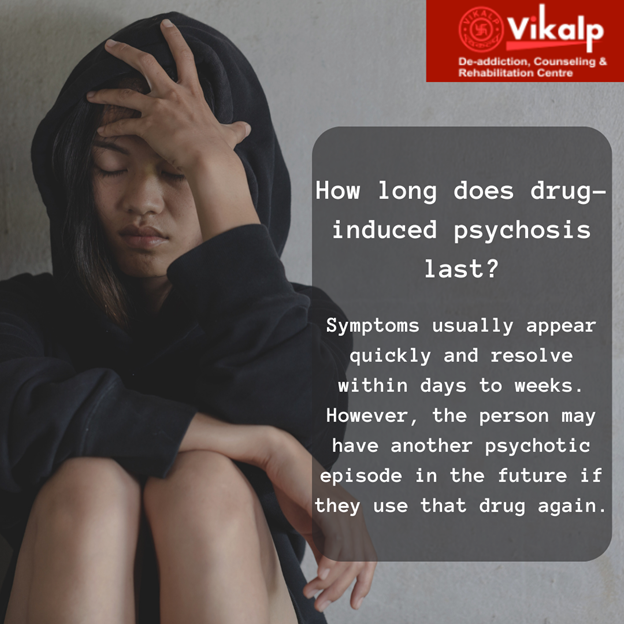What is Drug-Induced Psychosis and What are the Causes, Symptoms & Treatment?
Drug-induced psychosis, also known as substance-induced psychotic disorder, refers to a condition characterized by the presence of psychotic symptoms that are directly caused by the use of or withdrawal from substances such as drugs or alcohol. It’s important to differentiate drug-induced psychosis from primary psychotic disorders like schizophrenia, as the underlying causes and treatment approaches can differ significantly. There are a few rehabilitation centre in Delhi that help people with drug-induced psychosis, one of them is Vikalp Rehab.
At Vikalp Rehab, we have the best clinical psychologist that helps people with any addiction and mental health. We also educate people about drug-induced psychosis and try to make people aware of the disadvantages of drugs.
Causes of Drug-Induced
The exact mechanisms behind drug-induced psychosis are not fully understood, but it is believed that certain substances can disrupt the normal functioning of the brain, leading to the development of psychotic symptoms. Substances commonly associated with drug-induced psychosis include hallucinogens (such as LSD or magic mushrooms), stimulants (such as amphetamines or cocaine), cannabis, alcohol, and certain prescription medications. It is important to note that not everyone who uses these substances will develop psychosis, as individual susceptibility can vary.
Symptoms of Drug-Induced Psychosis
The symptoms of drug-induced psychosis are similar to those observed in primary psychotic disorders. Common symptoms include:
- Delusions: False beliefs that are firmly held despite evidence to the contrary. Delusions can take various forms, such as paranoid delusions (feeling persecuted or spied upon) or grandiose delusions (believing one has exceptional abilities or powers).
- Hallucinations: Sensory perceptions that occur in the absence of external stimuli. Auditory hallucinations (hearing voices) are particularly common in drug-induced psychosis, although visual hallucinations can also occur.
- Disorganized thinking and speech: Thoughts and speech may become fragmented, incoherent, or disorganized, making it difficult to communicate or maintain a logical flow of ideas.
- Disorganized behavior: Individuals may exhibit unusual or unpredictable behavior, such as dressing inappropriately, engaging in repetitive movements, or displaying reduced hygiene.
- Emotional instability: Mood swings, agitation, anxiety, or depression may be present, adding to the overall distress experienced by the individual.
Treatment of Drug-Induced Psychosis
The treatment of drug-induced psychosis involves addressing both the underlying substance use disorder and the psychotic symptoms. The specific approach may vary depending on the substance involved, the severity of symptoms, and individual circumstances. Here are some common components of treatment:
- Substance use disorder treatment: Detoxification and rehabilitation programs are often recommended to address the individual’s substance use and dependence. These programs may involve medical supervision, counseling, behavioral therapies, and support groups to promote abstinence and address the underlying causes of substance abuse.
- Medication: In some cases, antipsychotic medications may be prescribed to alleviate the psychotic symptoms. These medications work by targeting the neurochemical imbalances in the brain that contribute to psychosis. The choice of medication and dosage should be carefully determined by a qualified healthcare professional, taking into account factors such as the individual’s overall health, substance use history, and potential drug interactions.
- Psychotherapy: Cognitive-behavioral therapy (CBT) and supportive therapy can be beneficial in helping individuals cope with their symptoms, improve problem-solving skills, and develop strategies to prevent relapse. Therapy can also address any co-occurring conditions, such as anxiety or depression.
- Psychosocial support: Building a strong support system is crucial for individuals recovering from drug-induced psychosis. Family therapy, support groups, and community resources can provide emotional support, education, and practical assistance in maintaining long-term recovery.
- Lifestyle changes: Adopting a healthy lifestyle is essential for overall well-being and recovery. This includes regular exercise, proper nutrition, adequate sleep, and stress management techniques. Avoiding substance use and high-risk situations is vital to prevent relapse.
It is worth noting that for some individuals, drug-induced psychosis may resolve once the substance is cleared from their system and appropriate treatment is provided. However, in certain cases, especially with chronic and heavy substance use, permanent drug-induced psychosis may occur, which may require ongoing management and support. Just like drug-induced psychosis, alcohol-induced psychosis also has similar causes and effects. Get in touch with us and learn more about it.
Drug-induced psychosis refers to the development of psychotic symptoms as a result of substance use or withdrawal. It is important to identify and differentiate this condition from primary psychotic disorders to ensure appropriate treatment. At Vikalp Rehab, treatment involves addressing the underlying substance use disorder, managing psychotic symptoms with medication and therapy, and providing psychosocial support to aid in recovery and prevent relapse. If you or your loved one needs any help related to any drug, addiction, or mental health, you can contact us at any time.
792 total views, 6 views today

